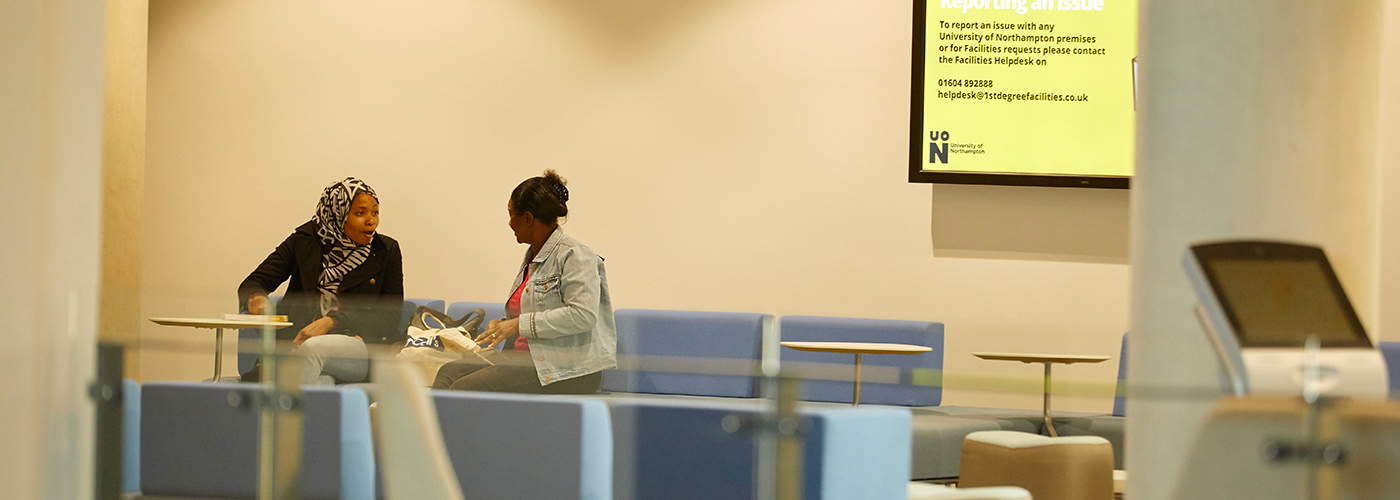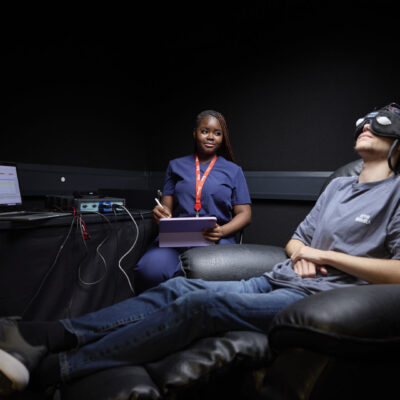Senior Lecturer in Psychology and Counselling
Faculty of Health, Sport and Behavioural Sciences

Counselling MSc
Key Facts
-
Level
Master'sPG MSc
-
Duration
2 years part time
-
Starting
September
SEP
-
Part Time: £945.00* per 20 credits
-
Waterside
Updated 17/11/2025
Updated 17/11/2025
Get in touch
For questions regarding study and admissions please contact us:
UK STUDENTS ENQUIRIES
Overview
The Masters degree in Counselling at the University of Northampton is an opportunity to gain a greater understanding of human thinking, reasoning and their actions and offers the chance to take the first steps into a career in counselling. Our MSc in Counselling course provides you with a level of knowledge and skills that will allow you to develop as counsellors, and once you have gained further experience and client hours you will be able to pursue a range of professional opportunities.
If you have a first degree in Psychology that is Graduate Basis for Chartered Membership (GBC) accredited, your postgraduate training opportunities will include doctoral training on British Psychological Society (BPS) accredited courses in Counselling Psychology.
Highlights
- Face-to-face client placement on the counselling masters.
- This Master’s counselling course can count towards a professional body accreditation with BACP.
Entry Requirements
In order to apply for this Master’s Counselling MSc degree, applicants will need either a first or second class bachelors’ degree. Additionally, applicants will be carrying out placements whilst working with clients. Having a critical self-awareness and a willingness to reflect on your own process throughout this course is therefore required. Voluntary or professional experience of support work with adults is desirable, but not essential.
You will be required to complete a Disclosure and Barring Service (DBS) check with our Placements office after enrolment. This will allow you to take part in your Supervised Face-to-face Client placement.
For information on how to apply to study a masters in counselling at the University of Northampton, please see our How to Apply page.
The closing date for applications is 1 September. Applications made after this date may be considered for the next available intake.
All offers of a place on the programme are subject to:
- a successful interview by the University
- you will be required to complete a Disclosure and Barring Service (DBS) check with our Placements office after enrolment. This will allow you to take part in a face-to-face client placement, which is a mandatory part of the course.
- due to BPS requirements, you must also complete the enrolment process by the end of the first teaching.
All International and EU students applying for a postgraduate counselling course with us must meet the following minimum English language requirements:
- Minimum standard – IELTS 6.5 overall (or equivalent)
with a score no lower than 6.0 for writing and no remaining band/component below 5.5 for study at postgraduate level.
For information regarding English language requirements at the University, please see our IELTS page.
Course Content
The Counselling MSc degree at the University of Northampton has been designed to contribute towards achieving the following United Nations Sustainable Development Goal: SDG3 Good Health and Wellbeing.
This Masters in Counselling course will help you to achieve sufficient communication skills as well as personal development skills which are useful and applicable to a number of organisations and situations. Students will be integrated into the learning process partnered with a supportive and motivational environment.
Our masters degree in counselling requires you to undertake a supervised placement of a minimum of 100 client hours plus supervision and a minimum 40 hours of personal therapy with an approved and registered or accredited counsellor or therapist. A student membership of the British Association for Counselling and Psychotherapy (BACP) is advised and professional indemnity insurance and a Disclosure and Barring Service (DBS) check will be required for placements.
The counselling masters modality is theoretical integrative, which means that you will be working to a specific integrative framework throughout the course. These frameworks draw on a range of traditional theories which you will also learn about, along with a wide range of the issues that clients may present with in counselling. The placement module allows you to take your competencies to organisations to work with clients.
Throughout your counselling masters, you will be encouraged to develop a critical, evaluative approach to the knowledge which underpins present-day professional practice as well as building your ability to make evidence-based decisions. Current issues within counselling and therapy will be considered critically with particular emphasis on their relationship to client practice.
Please note the modules shown here relate to the academic year 25/26. The modules relating to the academic year 26/27 will be available from June 2026.
How do I become a counsellor?
If you wish to pursue a counselling career or a related profession, such as a psychotherapist, you will need to complete core practitioner training that is at a minimum level of psychotherapy or counselling diploma. However, completing a Masters in Counselling will best equip you with the necessary practical skills and training, especially courses that include supervised placements.
What can I do with a Masters in Counselling?
A Masters degree in Counselling will allow you to pursue a number of career paths. Following completion of a MSc Counselling degree, you will have a deep understanding and appreciation of various therapies and presenting issues that will allow you to pursue a career in a wide variety of sectors. Graduates may secure roles in further and higher education, in charitable agencies and a wide range of businesses.
Other professional counselling opportunities include marriage and family counselling, substance abuse counselling, the NHS and private practice. Please note that many of these specialised roles require further training and additional experience is needed before entering into private practice.
Is MSc Counselling an accredited course?
Although the counselling MSc course is not accredited it may be used as a basis for personal accreditation with BACP once further experience and an additional 350 client hours have been gained.
Fees and Funding
2025/26 Tuition Fees
Fees quoted for this counselling masters relate to study in the Academic Year 25/26 only and may be subject to inflationary increases in future years.
- UK – Part Time Part Time: £945.00* per 20 credits
*Fee may be subject to an inflationary increase in 26/27.
- It is compulsory for Counselling MSc students to complete at least 40 hours of personal therapy which you would need to pay for (average costs £30 to £50 per hour).
- BACP student membership is required for many placements (currently £82 per year).
- Supervision of the client work is compulsory and students may need to contribute to the cost of supervision at the placement agency, or if the agency does not provide this they will need to find and pay for a private supervisor (average of £40 to 60 per hour; a minimum of two hours of individual supervision or equivalent is required per month from the start of the placement).
- You may also need to pay for professional indemnity insurance (costs vary; around £100 per year) if your agency does not cover you for this. Some agencies also require trainees to attend their training which they may charge for.
- Travel costs to and from placements, and extra costs associate with placements, may be incurred throughout your studies depending on where you are based.
For information on the scholarships available to you, please see our scholarships page.
For more information about possible funding options, please visit our Fees and Funding pages.
Fees quoted for this counselling masters relate to study in the Academic Year 24/25 only and may be subject to inflationary increases in future years.
- UK – Part Time Year 1 £4,140 (90 Credits) / Year 2 £4,140 * (90 Credits)
*Fee may be subject to an inflationary increase in 25/26.
Staff
Careers and Employability
Upon completion of your master’s in counselling, you may find employment opportunities within NHS settings or schools, as well as further or higher educational counselling settings. Various opportunities are available within organisational settings and police settings, as well as in continuing professional development (CPD) work. The government agenda for Improved Access to Psychological Therapies (IAPT) offers good opportunity for trained counsellors. Please note, it is not appropriate to go into private practice immediately on qualifying from a postgraduate counselling course.
Facilities and Equipment
- Three dedicated psychology technicians available to support students
- Six research cubicles







